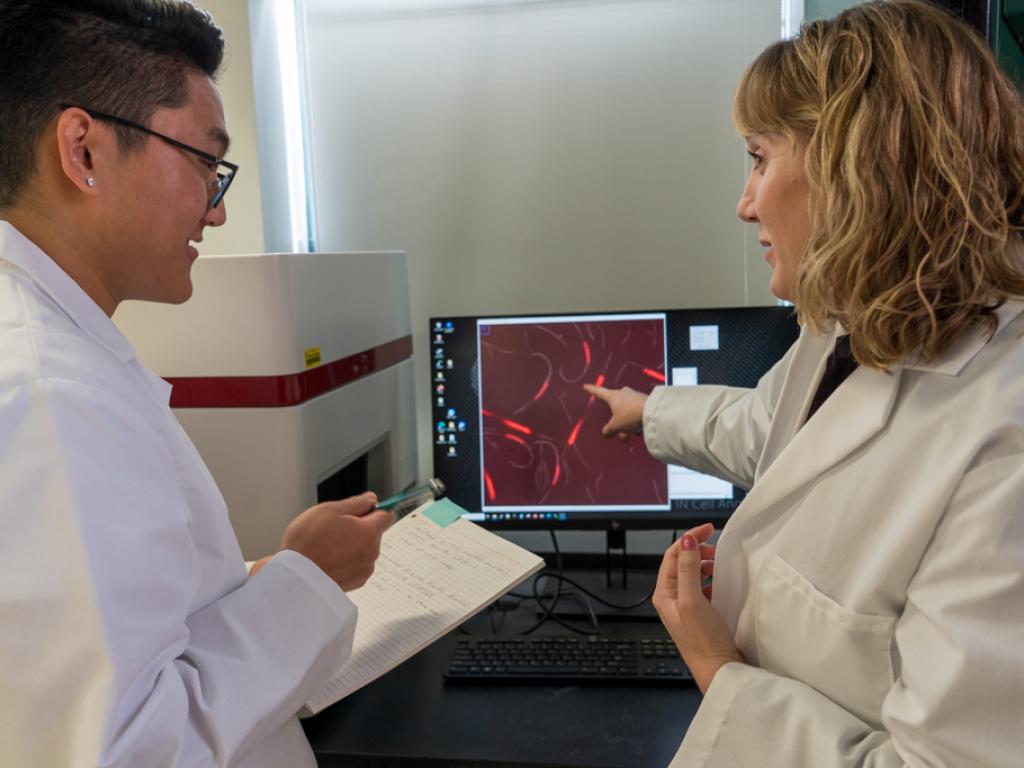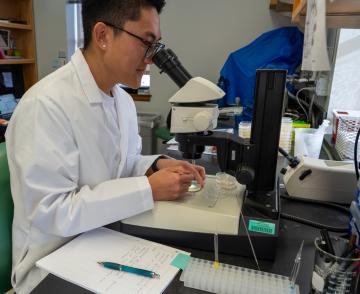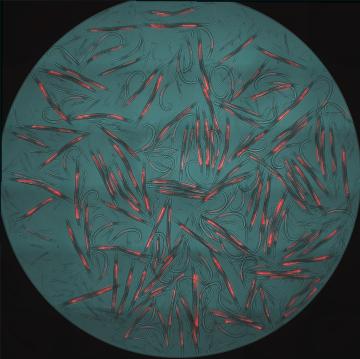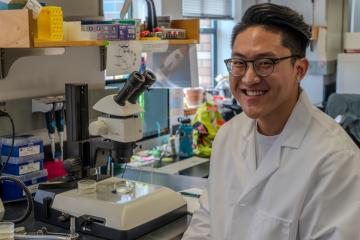
In this Q&A with Hui Undergraduate Research Scholar Nic Lee, a biology major, and Cori Cahoon, Libuda lab postdoctoral fellow, discuss Lee’s research experience as an undergraduate.
Office of the Vice President for Research and Innovation (OVPRI): Let's start with the Libuda Lab as a whole. What is the broad scope of the work in the lab?
Nic Lee (NL): We’re using a model organism, C. elegans (a 1 millimeter-long nematode worm) to work on different studies concerning the reproductive system and DNA breaks that occur during specific events in reproduction. The Libuda Lab’s focus is on how DNA is accurately replicated during sperm and egg development.
Cori Cahoon (CC): We study how sperm and egg cells are made and how the genome is preserved from the parental cells to those sperm and egg cells. The lab is focused on two areas: the mechanisms of genomic integrity and how the environment influences the genomic integrity of developing sperm and eggs. Specifically, mine and Nic’s research focus on the sex-specific temperature responses of developing sperm and egg to understand the mechanisms that render sperm unable to tolerate elevated temperatures while eggs can.

OVPRI: What is the purpose of the lab’s research? What is the mission?
NL: A potential commercial application of the work we're doing is creating effective birth control methods. We know there are contraceptives available for women, but there's not really anything equivalent for males. Our work, with additional research, could help to develop a birth control product for men by affecting the viability of male sperm.
OVPRI: Nic, what got you into research here at the University of Oregon?
NL: It was my third year here and I started getting into the upper division classes, and that's when a lot of the professors started talking about their labs. I got the itch to apply to labs because when I was in these upper division courses, I felt like I wanted more, I wanted to learn more, to apply what I was learning, and get more hands-on experience. Working in the lab environment gave me the motivation to understand more deeply the science that I know I was interested in.
OVPRI: What specific project are you working on Nic?
NL: I’m working with Cori on her work with sexually dimorphic mutants, so the sex-specific differences in the response of developing sperm and eggs to environment temperature stress. We are working with a protein complex in meiosis to see how the proteins within this complex are affected by mutants that impact the temperature sensitivity of developing sperm.
CC: Nic is helping me with a screen that looks for mutants that suppress temperature sensitivity. So, he’s identifying the mutant proteins and characterizing how those proteins influence the temperature sensitivity of developing sperm.

OVPRI: How has being in the lab and having Cori as your mentor furthered your education and research goals?
NL: Academically it’s been incredible. I’m always getting a flow of information that’s relevant to what I’m learning in my classes. It’s been amazing to be able to pick everyone’s brain about their career paths and how they got here. Something I struggle with is figuring out my purpose in science and where I fit in. Asking everyone that exact question and seeing why they’ve stuck with research has given me a clearer idea of what I want to do in the future.
OVPRI: What are your favorite aspects about conducting research?
NL: I would say my favorite thing would be the environment of the lab. Diana (Libuda) has been a great primary investigator and allows me to ask any questions. Same with Cori—she’s always there if I need any help. That openness has been calming and allowed me to enjoy my time in the lab.
CC: Diana has spent a lot of time building the community we have in the lab. Science is hard, so it’s nice to have a really supportive group of people when you come into work.
OVPRI: What’s the broader impact of the research being conducted in the lab?
CC: My research specifically is focusing on one small aspect of how sperm are being affected by temperature. The lab more broadly is trying to understand all the other mechanisms and how those are synergistically interacting to ultimately cause male fertility. From a human perspective, infertility in men is a huge problem for couples trying to conceive a child. From an environmental perspective, with climate change, temperature is increasing, and heat waves are becoming more common, which has been shown to impact organism populations due to defects in reproduction. On an ecological scale, this could become a huge problem with potential non-human species extinction events. We are really hoping to understand what’s going on with the sperm that makes it so temperature sensitive, with the goal of being able to prevent these events from happening. It’s not just little worms; it’s a much bigger problem.
OVPRI: Nic, what is some advice you would give to other students looking to do research during their undergraduate years?
NL: I would say getting into a lab is the biggest hurdle. It’s all about persistence. Have that little bit of courage to put yourself out there, and don’t be afraid of rejection. Time management can also be tough; you should be clear on how much time you’re willing to commit and should communicate that with the lab.

CC: When you have a reciprocal commitment, you get a relationship between mentor and mentee that really thrives. For any undergraduate trying to get into scientific research, I would say make sure you can commit a significant amount of time because you get out what you give. Don’t be afraid to be inquisitive and ask questions. Talk to your teaching assistants because they’re the ones who will likely be your direct mentors in the lab. We want to help students learn transferable skills during their experience in the lab.
Additionally, for students who are interested in science and doing full-time summer research, now is the time to start applying and thinking about it. The OURS Summer Program for Undergraduate Research application opens March 4. You don’t have to have been in a lab to apply for these programs. You don’t have to volunteer for free; you can get financial support. Doing full-time research during the summer is hugely different than doing research during the school year. You get the chance to take a project, collect data, analyze that data, and present your findings through the OURS program. That is a fantastic experience for students who want to get into research.
OVPRI: That’s great to know. Nic, you’re a Hui Undergraduate Research Scholar. How has your participation in that competitive scholarship program open to students majoring in STEM disciplines from a marginalized background affected your studies and your science?
Nic: The Hui program strengthened Cori and I’s relationship as mentee and mentor. The program requires you to work full-time in a lab over the summer which allowed me to fully immerse myself in research. The financial support from the Hui program and the continuous encouragement from my lab created a passion for research. Research has provided me with purpose. There’s purpose in what I’m learning in class and purpose in the work I’m putting in everyday during lab.
— By Lauren Hodges, Office of the Vice President for Research and Innovation
